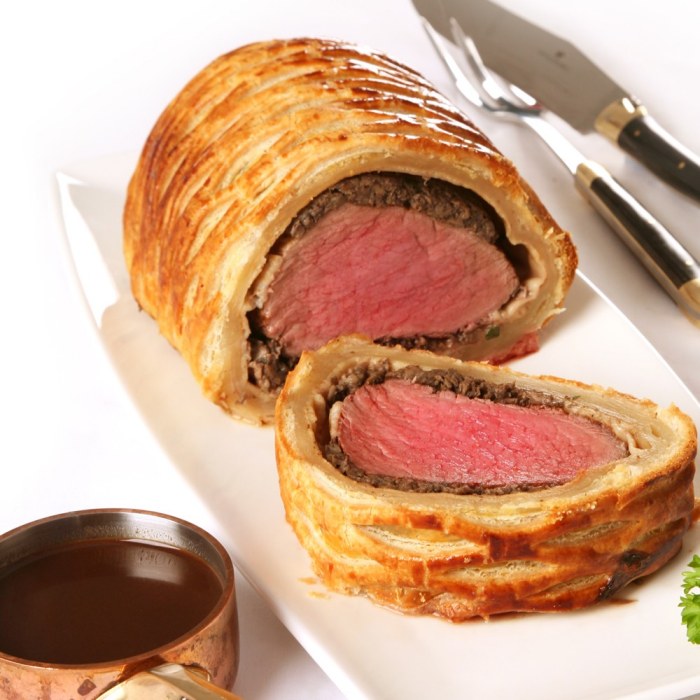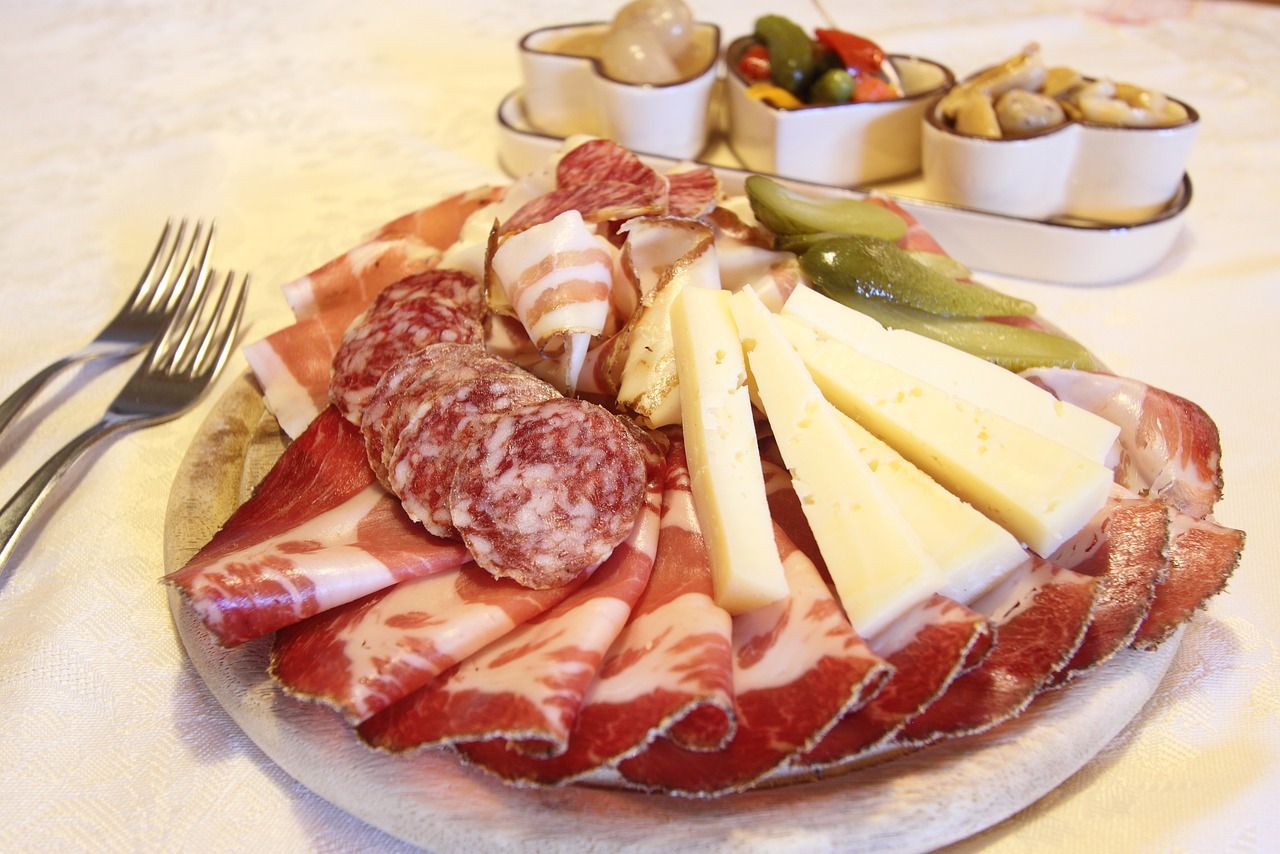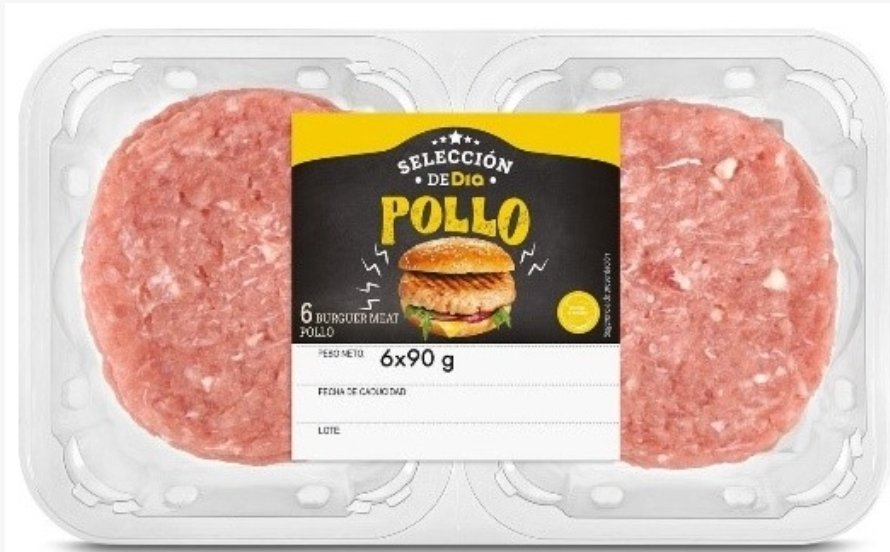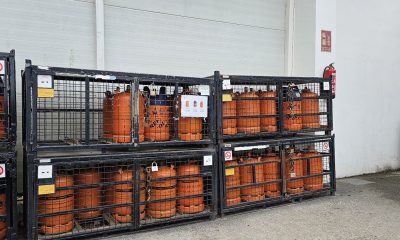Food and Drink
Beef Wellington

Without a doubt, one of the most popular dishes on the Costa Blanca during the winter months is an English steak meal called Beef Wellington, which is created from fillet steak that has been coated with duxelles and pâté (usually foie gras pâté), wrapped in shortcrust pastry, and baked. To keep the coated meat from getting soggy, several recipes call for wrapping it with prosciutto or dry-cured ham.
The tenderloin can be chopped into individual sections before wrapping and baking, or it can be wrapped and roasted whole and then sliced for serving

Ingredients
- 400 g mushrooms
- 1-2 tbsp English mustard
- Dash of olive oil
- 750 g piece of beef
- 6-8 slices parma ham
- 500 g puff pastry
- dusting flour(plain)
- 2 beaten egg yolks
Instructions
Put the mushrooms into a food processor with some seasoning and pulse to a rough paste. Scrape the paste into a pan and cook over a high heat for about 10 mins, tossing frequently, to cook out the moisture from the mushrooms.
Spread out on a plate to cool.
Heat in a frying pan and add a little olive oil and season the beef and sear in the hot pan for 30 secs only on each side. (You don't want to cook it at this stage, just colour it).
Remove the beef from the pan and leave to cool, then brush all over with the mustard.
Lay a sheet of cling film on a work surface and arrange the Parma ham slices on it, in slightly overlapping rows.
With a palette knife, spread the mushroom paste over the ham, then place the seared beef fillet in the middle.
Keeping a tight hold of the cling film from the edge, neatly roll the Parma ham and mushrooms around the beef to form a tight barrel shape. Twist the ends of the cling film to secure. Chill for 15-20 mins to allow the beef to set and keep its shape. Roll out the puff pastry on a floured surface to a large rectangle, the thickness of a £1 coin.
Remove the cling film from the beef, then lay in the centre. Brush the surrounding pastry with egg yolk. Fold the ends over, the wrap the pastry around the beef, cutting off any excess.
Turn over, so the seam is underneath, and place on a baking sheet.
Brush over all the pastry with egg and chill for about 15 mins to let the pastry rest. Heat the oven to 200C, 400F, gas 6. Lightly score the pastry at 1cm intervals and glaze again with beaten egg yolk.
Bake for 20 minutes, then lower the oven setting to 180C, 350F, gas 4 and cook for another 15 mins.
Allow to rest for 10-15 mins before slicing and serving with the side dishes of your choice.
The beef should still be pink in the centre when you serve it.
Discover more from Costa Blanca Daily
Subscribe to get the latest posts sent to your email.
Food and Drink
Global wine consumption fell by 3.3% in 2024, reaching its lowest level since 1961

The estimation for global wine consumption in 2024 is 214 million hectolitres, which is a 3.3% decrease from 2023. This figure would represent the lowest global consumption level since 1961 if it is confirmed.
The International Organisation of Vine and Wine (OIV) proclaimed this on Tuesday, April 15th, emphasising the significance of multilateral cooperation and adaptability to evolving circumstances. The organisation published statistics on production, consumption, and trade for all producing and consuming countries (more than 180) in order to provide a comprehensive overview of the sector for the 2024 calendar year.
Particularly, he observed that this decrease in consumption is the result of “a confluence of economic and geopolitical factors that generate inflation and uncertainty, as well as a decline in mature markets, driven by evolving lifestyle preferences, shifts in social habits, and generational changes in consumer behaviour.” Nevertheless, the consumption of wine has never been so prevalent on a global scale in 195 countries. It is important to bear in mind that numerous countries with substantial populations and high aggregate consumption still possess substantial growth potential.
The OIV observed that the global vineyard area has decreased over the past four years. A reduced rate of decline was suggested by a 0.6% contraction to 7.1 million hectares in 2024. The primary reason for this decline is the clearance of vineyards in the primary wine-growing regions. However, certain countries are exhibiting a dynamic expansion of their vineyards, as explained.
In 2024, it is anticipated that the global wine production will reach 226 million hectolitres, the lowest level in over 60 years, a 5% decrease from 2023. This is predominantly the result of climate change, which is driving unpredictable and extreme weather events in both the northern and southern hemispheres.
Maintaining equilibrium between supply and demand
The OVI anticipates that the global market balance will persist in 2024, despite the ongoing declines in both production and consumption. This is due to the fact that production is unlikely to surpass demand, a trend that was observed during the subpar 2023 harvest. “The market may be stabilised by two consecutive years of low production, although stock levels are expected to remain inconsistent across regions.” “International trade preserves its volume and value,” it clarified.
The export volume remained consistent at 99.8 million hectolitres. The average export price of €3.60/litre remains at a historically high level, despite a minor decrease in export value by 0.3% to €36 billion. In comparison to pre-pandemic years, prices remain elevated by nearly 30% due to inflation and inadequate supply.
Director General John Barker of the OIV stated that the wine sector faces a challenge in adapting to all of these impacts; however, successful adaptation will provide opportunities. These are the components that will propel progress in the wine sector: collaborating to create climate change solutions and establish wine as a sustainability benchmark; investing in research on new audiences to gain a better understanding of their perspective on wine; and fortifying our dedication to global trade and multilateralism.
Discover more from Costa Blanca Daily
Subscribe to get the latest posts sent to your email.
Costa Blanca
UK bans EU cheese and meat to stop disease spreading

The UK government has implemented a temporary prohibition on the importation of cheese and meat products from the EU by holidaymakers in order to mitigate the transmission of foot-and-mouth disease.
Since Saturday, travellers have been prohibited from returning with items such as cured meat and cheese, including those used in sandwiches, as a result of the expanding pandemic on the continent.
Regardless of whether the products are purchased from a duty-free store or are packaged or packed, the restrictions remain in effect.
It follows an earlier prohibition of comparable products from Hungary, Slovakia, Germany, and Austria in response to the escalating prevalence of the cattle disease in those nations.
The restrictions are applicable to individuals who arrive in Great Britain, not Northern Ireland, Jersey, Guernsey, or the Isle of Man.
If individuals attempt to bring in products, they will be confiscated and destroyed. In “serious cases,” individuals may be subject to a fine of up to £5,000.
Among the restricted products are:
Pork, beef, lamb, mutton, goat, venison, other products created from these meats, such as sausages milk and dairy products like butter, cheese, and yoghurt.
Individuals are permitted to bring a maximum of 2kg of reconstituted infant milk, infant food, or special food that is required for medical purposes.
Foot and mouth disease is a highly contagious virus that can result in lameness and nutrition difficulties, as well as blisters in the mouth and under the hooves of animals.
At present, there are no instances of foot-and-mouth disease in the United Kingdom.
The most recent outbreak in the United Kingdom occurred in 2001. Despite the fact that there were only 2,000 confirmed cases, over six million sheep, cattle, and swine were slaughtered.
This is due to the fact that each of those instances resulted in the slaughter and burning of all of the livestock on a property.
The National Farmers Union’s president, Tom Bradshaw, expressed his satisfaction with the government’s decision to extend the initial prohibition, stating that it was “quick” to implement it.
He stated that “increased border controls are imperative” in order to contain the disease.
Mr. Bradshaw advocated for “a comprehensive cross-government biosecurity plan that would establish these restrictions on a permanent legislative basis and receive the requisite investment.”
The Guild of Fine Food, which represents independent food and drink retailers, stated that the ban on ‘holiday treats’ was ‘hurried’. However, it also noted that it brought the UK government’s policy for holidaymakers more in accordance with the restrictions already in place for small businesses.
“The food and drink industry is unequivocally in favour of the importance of biosecurity and the protection of our farmers,” stated John Farrand, the managing director of the Guild of Fine Food.
He stated, however, that the “bureaucracy” that was implemented following Brexit had imposed “significant constraints” on minor food and drink importers and exporters..
Discover more from Costa Blanca Daily
Subscribe to get the latest posts sent to your email.
Costa Blanca
Salmonella found in Día’s chicken burgers

The ‘Día Selection’ brand of chicken patties has been found to contain Salmonella by health authorities.
After receiving notification through SCIRI, the rapid information exchange system between autonomous communities, the Spanish Agency for Food Safety and Nutrition (Aesan) activated the food alert protocol.
The product in question is batch number 250969 and has an expiration date of 19/04/2025.
Plastic containers are used to present these packages, which contain six units each weighing 90 grammes, for a total weight of 540 grammes. They are stored in the refrigerator.
The initial distribution encompassed nine autonomous communities: Andalusia, Aragon, Asturias, Castile and Leon, Castile-La Mancha, Catalonia, Valencian Community, Galicia, and Madrid.
Nevertheless, AESAN issued a cautionary note regarding potential secondary redistributions to other regions.
It is recommended that consumers who have this product refrain from eating it.
It is advised that you visit a health centre immediately if you have consumed the contaminated hamburgers and are experiencing symptoms such as diarrhoea, vomiting, fever, or headache, which are indicative of salmonellosis.
The authorities’ actions
The immediate withdrawal of the product from points of sale was coordinated by AESAN in collaboration with the afflicted autonomous communities. The SCIRI (Spanish Agency for International Trade and Development) facilitated the rapid dissemination of the alert to all potentially affected regions in order to safeguard public health.
Salmonella is one of the primary causes of foodborne illness, and this microbiological contamination poses a substantial health risk. To monitor potential cases associated with this outbreak, authorities are maintaining their surveillance protocol.
Discover more from Costa Blanca Daily
Subscribe to get the latest posts sent to your email.
-

 Costa Blanca2 weeks ago
Costa Blanca2 weeks agoTorrevieja fails to comply with its commitment to open new road at La Hoya for Easter
-

 News2 weeks ago
News2 weeks agoMadrid-Lisbon high-speed train to cut journey time from 10 hours to three
-

 Costa Blanca2 weeks ago
Costa Blanca2 weeks agoDriver arrested, one dead and two injured after car hits cyclists in Calpe
-

 Costa Blanca2 weeks ago
Costa Blanca2 weeks agoA swimmer adrift in an inflatable rescued off Guardamar beach
-

 Costa Blanca2 weeks ago
Costa Blanca2 weeks agoGoodbye forever to the traditional butane gas bottle
-

 News2 weeks ago
News2 weeks agoPope Francis has died, the Vatican says
-

 Costa Blanca2 weeks ago
Costa Blanca2 weeks ago“Drug Supermarket” in Denia closed by Police
-

 Costa Blanca2 weeks ago
Costa Blanca2 weeks agoFirefighters extinguish fire in a restaurant in the centre of Murcia
